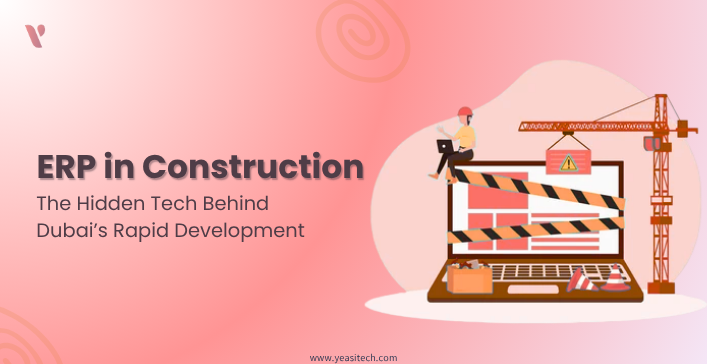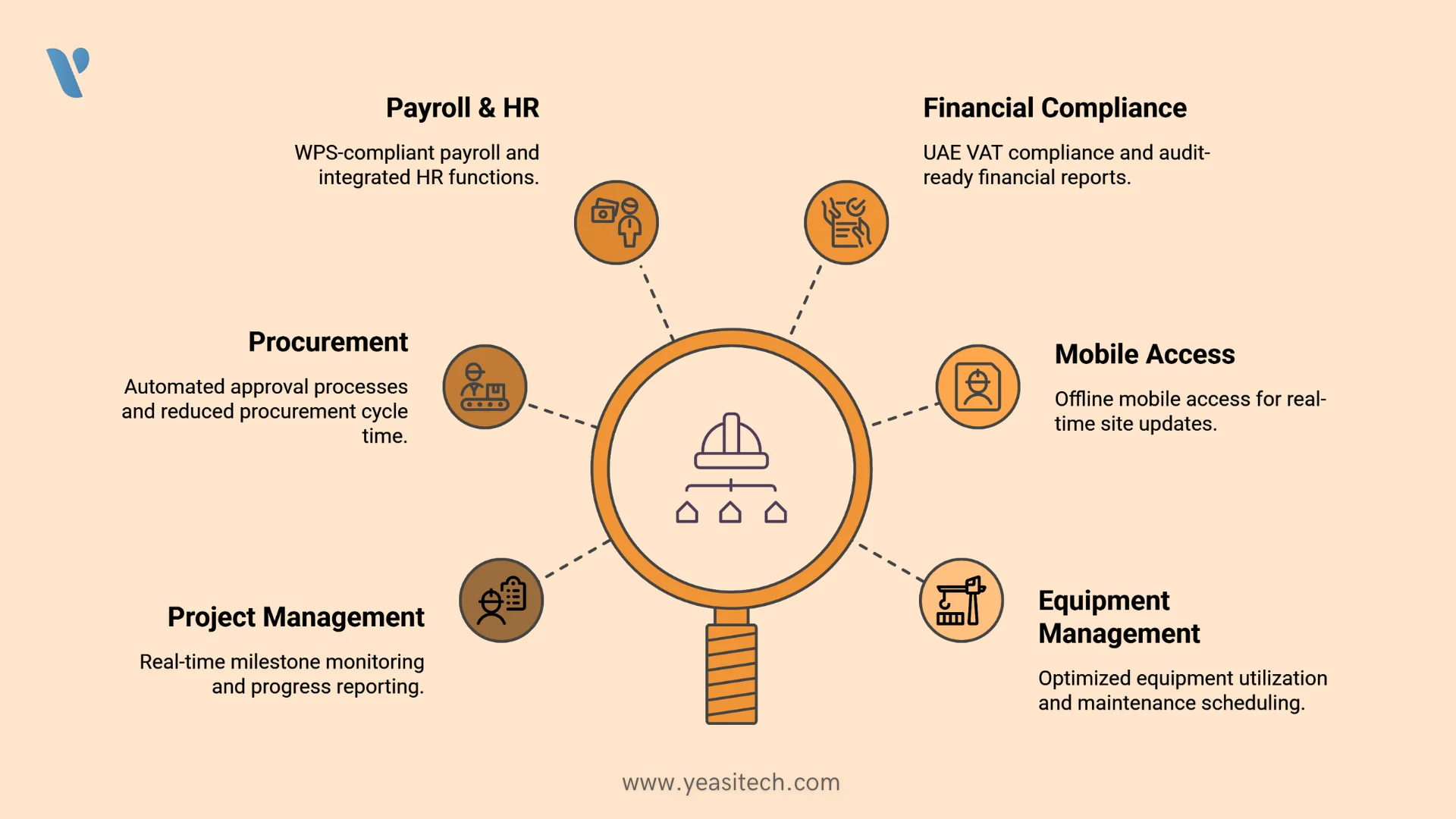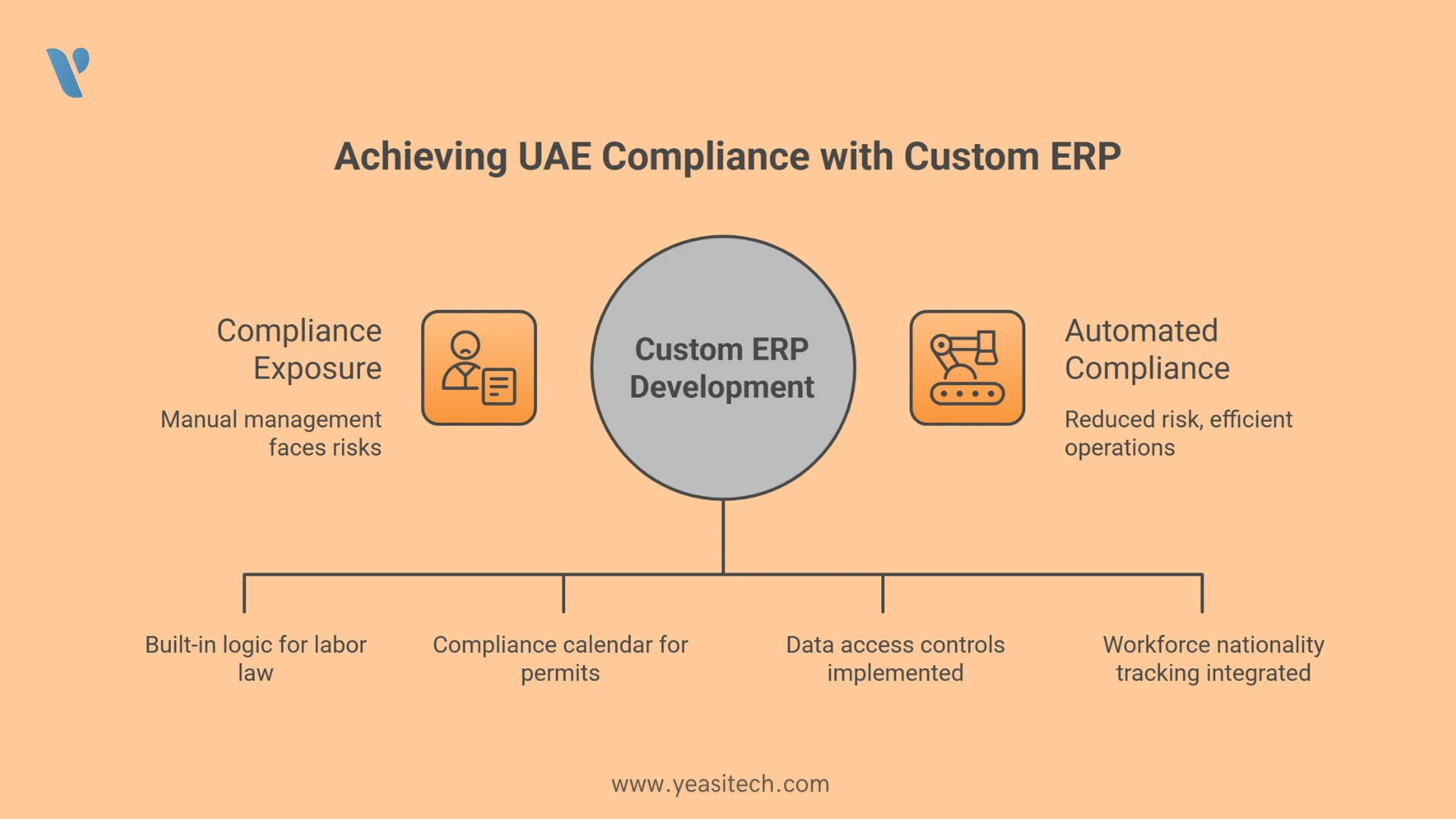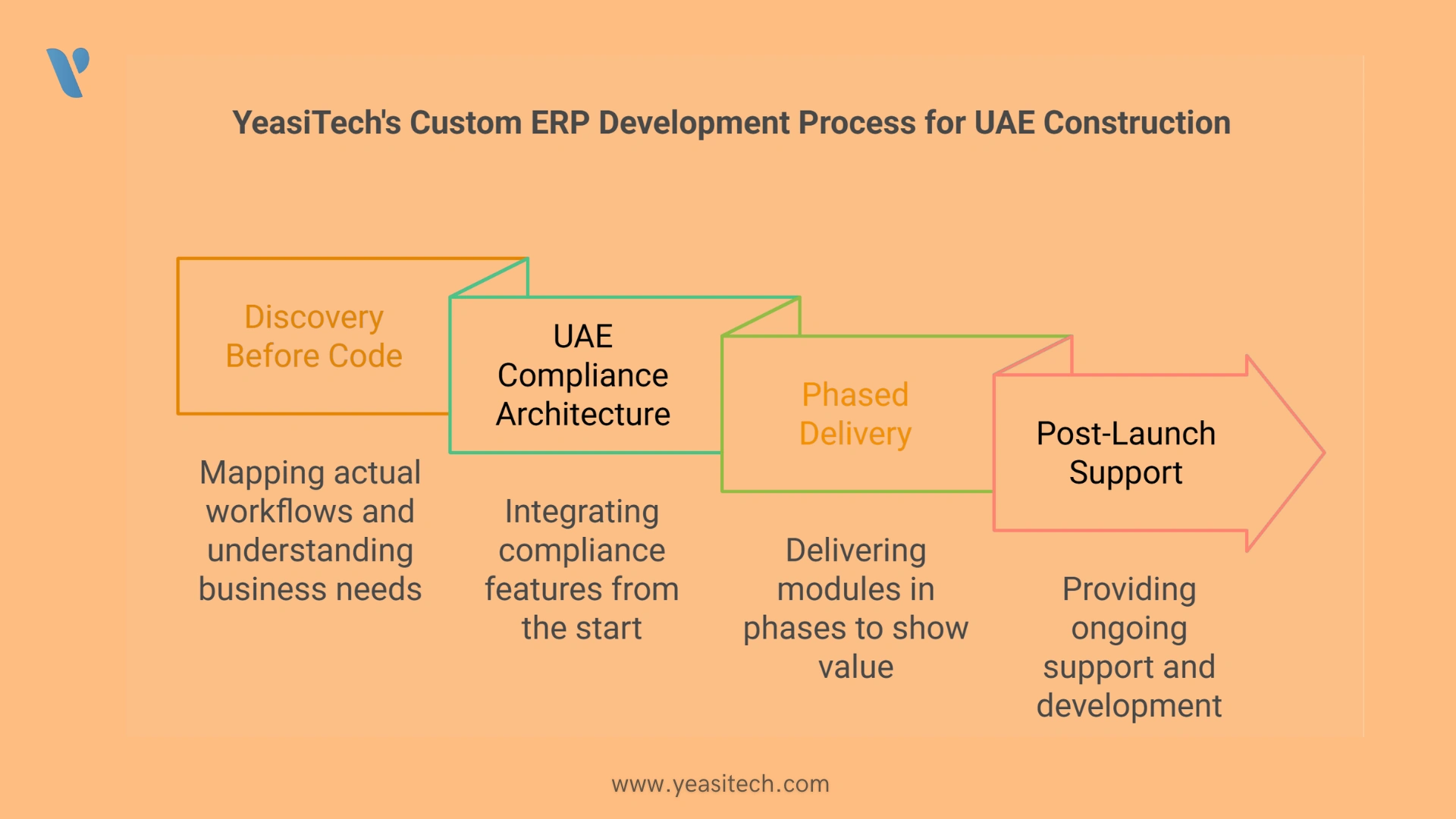Custom ERP Development UAE: Complete Cost & Compliance Guide for Construction Industry 2026

UAE construction is booming. In the United Arab Emirates, hundreds of billions of dirhams are being driven by the development of Expo City, the Dubai Urban Master Plan 2040, and the Vision 2031 megaprojects. However, behind the cranes and concrete, the majority of mid-sized contractors continue to manage five sites via WhatsApp groups, process WPS payroll by hand, and conduct procurement on spreadsheets.
The problem is not ambition. It is infrastructure. Generic ERP platforms like SAP, Oracle, and Microsoft Dynamics were built for Western manufacturing firms, not for contractors managing multicultural workforces, UAE VAT across joint ventures, Ministry of Labour compliance, and bill of quantities based project budgets at the same time.
This guide covers everything UAE construction companies need to know about Custom ERP Development UAE, what it actually includes, what UAE compliance requirements it must handle, real costs versus off the shelf alternatives, and the ROI companies in this market are seeing after implementation.
If you are evaluating ERP options for your construction business in Dubai, Abu Dhabi, or anywhere across the UAE, this is the honest breakdown nobody else is giving you.
Most people think custom ERP means taking SAP and painting it a different color. Wrong. Custom ERP development is building software around your actual workflows – not adapting your workflows to fit software that was designed for someone else’s business. In UAE construction specifically, that difference matters in every module.
Your project management isn’t generic task tracking. It’s BOQ-based milestone management across multiple sites with offline mobile access for supervisors in areas with poor connectivity. Your procurement isn’t a purchase order form. It’s an authority matrix with multi-level approvals, vendor performance scoring, and budget alerts that fire before you’ve overspent, not after.
This is what separates custom ERP development for construction UAE from off-the-shelf platforms. The system fits your business. Not the other way around.

When we talk about custom ERP development for construction UAE, we’re not talking about rebranding an existing product. We’re talking about building software around your actual workflows – the way your site managers track progress, the way your procurement team handles subcontractors, the way your finance team files VAT across multiple projects.
In the United Arab Emirates, every construction project requires a workforce that speaks twelve different languages, various sites, and multiple subcontractors. Milestone monitoring, progress reporting, BOQ (Bill of Quantities) management, and real-time site updates from an offline mobile app in distant desert locales must all be handled by your ERP. Generic systems offer project management. Custom systems offer your project management.
UAE construction procurement is complex. Your project’s overall timing is impacted by the local vendors, foreign material imports, subcontractor agreements, and delivery schedules you oversee. Custom ERP creates approval processes that align with your authority matrix, connects purchase orders to project budgets directly, and automatically notifies you of delivery delays. Following implementation, the average procurement cycle time decreases from 7–14 days to 2-3 days.
The UAE Wage Protection System (WPS) requires all employers to pay salaries through approved financial institutions on time, every time. Non-compliance triggers Ministry of Labour investigations, project holds, and fines. A custom ERP integrates WPS filing directly into your payroll cycle. No manual exports, no formatting for bank uploads, no compliance risk from data entry errors.
Construction VAT in the UAE is not straightforward. Joint ventures, retention clauses, subcontractor billing, and partial payments all create VAT scenarios that off-the-shelf systems handle poorly or not at all. Custom ERP builds your specific VAT logic, integrates with Federal Tax Authority requirements, and generates audit-ready reports that your finance team can file with confidence.
It is not permitted for site supervisors to use computers on building sites. Engineers may access task assignments, material deliveries, safety checklists, and progress images in real time using custom mobile ERP apps. When connectivity is restored, they sync after operating offline. There is no need for manual data re-entry because data collected on-site is fed straight into project dashboards at the head office.
Heavy equipment sitting idle costs money. Materials sitting in the wrong location causes delays. Custom ERP tracks equipment location, maintenance schedules, and utilization rates across all your sites. When a crane is due for service or a concrete pour needs materials relocated, your system tells you before the deadline, not after.
Fun Fact: The UAE construction market is projected to reach AED 550 billion by 2030, driven by UAE Vision 2031 megaprojects. Generic software wasn’t built for this scale, this regulatory environment, or this workforce complexity.

This is where most companies underestimate the complexity. UAE construction operates under a layered regulatory environment that most off-the-shelf ERP vendors have never had to navigate. Custom ERP development for construction in UAE has to get this right from day one – retrofitting compliance after launch is expensive and often incomplete
Beyond WPS payroll, MOHRE regulates worker accommodation standards, overtime limits, leave entitlements, and end-of-service gratuity calculations. Your ERP needs built-in logic for UAE Labour Law gratuity calculations, automatic alerts for contract renewals, and documentation storage for worker permits and visas. A construction company with 500 workers managing this manually faces permanent compliance exposure.
Abu Dhabi Municipality, Dubai Municipality, and Sharjah Municipality each have specific inspection and permit requirements. Custom ERP builds a compliance calendar that tracks permit expiry dates, safety certificate renewals, inspection schedules, and insurance coverage. Automated alerts mean a lapsed permit never shuts down a site unexpectedly.
The UAE Personal Data Protection Law (Federal Decree-Law No. 45 of 2021) applies to any digital system handling employee or client data. Your ERP must implement proper data access controls, consent mechanisms for employee data, and breach notification procedures. Fines reach AED 5 million. Custom development builds compliance into the architecture rather than patching it onto a foreign system.
For larger construction firms, Emiratization quotas are tracked and reported to regulatory bodies. Custom ERP integrates workforce nationality reporting, flags upcoming quota thresholds, and generates the documentation required for government tenders that mandate minimum Emirati employment levels.
Let’s be direct about money. Custom ERP development for construction in UAE has a higher upfront cost than buying a licence for SAP or Oracle. That’s true. But the total cost of ownership calculation looks very different over 5 years.
| Module | Custom Build Cost | Off-the-shelf Annual Fee |
|---|---|---|
| Project & Site Management | AED 30,000-50,000 | AED 18,000-35,000/yr |
| Procurement & Inventory | AED 20,000-35,000 | AED 10,000-20,000/yr |
| Payroll & HR (WPS) | AED 15,000-25,000 | AED 8,000-15,000/yr |
| UAE VAT & Compliance | AED 15,000-30,000 | AED 6,000-12,000/yr |
| Mobile Site Access | AED 12,000-20,000 | AED 5,000-10,000/yr |
| Analytics & Reporting | AED 10,000-18,000 | AED 4,000-8,000/yr |
| Total Investment | AED 102,000-178,000 | AED 51,000-100,000/yr |
| One-time. Yours forever. | Recurring. Forever renting. |
Key insight: Off-the-shelf licensing compounds. AED 60,000/year becomes AED 300,000 over 5 years – and you still don’t own it. Custom ERP is yours permanently, adapts to your growth without per-seat fee increases, and includes the UAE-specific modules that off-the-shelf vendors charge extra for or don’t offer at all.
Most UAE construction companies that switch to custom ERP after starting with off-the-shelf products report that their total investment in the off-the-shelf system – including licences, customization, and integration – exceeded what custom development would have cost, without delivering the same functionality.
Numbers matter more than promises. Here’s what UAE construction companies typically see after implementing custom ERP:
| Pain Point | Without Custom ERP | With Custom ERP |
|---|---|---|
| Cost overruns | 15-25% avg overrun | Below 5% overrun |
| Procurement cycle | 7-14 days | 2-3 days |
| Payroll processing | 3 days manual | 6 hours automated |
| Compliance penalties | AED 3K-5M risk | Near zero risk |
| Project visibility | Weekly reports | Real-time dashboard |
The 23% faster project completion rate cited in Middle East construction studies isn’t magic – it comes directly from removing the coordination failures that cause delays. When procurement, site management, payroll, and finance all operate in one system with real-time data, the daily frictions that cost weeks across a project simply disappear.
The best evidence for custom ERP isn’t sales copy – it’s what companies actually achieved after implementation. These are publicly documented cases from the UAE and broader GCC construction sector
A Dubai-based mid-tier contractor was experiencing 15-20% project cost overruns, traced primarily to procurement delays. Manual purchase order approvals, disconnected vendor management, and no real-time budget alerts meant overruns were discovered weekly, not daily. After implementing custom ERP with automated procurement workflows and budget alert triggers:
An Abu Dhabi infrastructure group was processing payroll manually across five construction sites. The process took 3 days every month, involved 4 finance staff, and produced regular errors that triggered worker complaints and compliance flags. After implementing custom ERP integrated with biometric devices and WPS direct filing:
Abu Dhabi’s Aldar Properties, one of the UAE’s largest real estate developers, invested significantly in integrated digital systems across their construction projects as part of their broader digital transformation. Their approach – building systems around UAE regulatory requirements rather than adapting Western platforms – resulted in improved project delivery timelines and cost control across their AED multi-billion portfolio. The lesson for contractors: systems built for the UAE market outperform adapted generic platforms.
While not construction-specific, Places UAE’s implementation of Arabic-native search using purpose-built technology demonstrates what happens when you build for your market rather than adapt generic solutions. Arabic search usage increased 1,000%, daily searches rose 267%, and total searches surpassed 100,000. The parallel for construction ERP is direct: when systems are built for how UAE businesses actually operate, adoption and ROI follow naturally.

Most development companies will tell you they can build anything. That’s true – but building custom ERP for UAE construction specifically requires more than general development capability. It requires knowing the regulatory environment, understanding how UAE construction projects actually run, and having experience navigating the specific technical challenges of this market.
YeasiTech specializes in custom ERP development for construction in UAE. Here’s what that means in practice:
We spend the first 2-3 weeks mapping your actual workflows – not what your org chart says should happen, but what your site managers, procurement team, and finance staff actually do. The most expensive ERP mistakes come from building the wrong thing perfectly. We build the right thing by understanding your business first.
WPS integration, FTA VAT filing, MOHRE reporting, and PDPL data handling are built into the architecture from day one, not bolted on after. Your compliance requirements are not an afterthought – they’re a design constraint that shapes every module we build.
We don’t disappear for 6 months and come back with a finished product. We deliver in phases – typically payroll and finance first (highest compliance risk), then procurement, then project management, then mobile access. Each phase goes live and proves value before the next begins. This approach means you’re seeing ROI within 8-12 weeks of starting.
UAE regulations change. Your business grows. New projects require new workflows. We provide ongoing support and development as your ERP evolves with your business – not through expensive annual licence renewals, but through a development relationship that continues after launch.

UAE construction is moving fast. Projects are bigger, compliance is stricter, and the margin for operational error is shrinking. Without custom ERP development for construction UAE, companies risk falling behind on efficiency, compliance, and profitability. The right ERP gives you:
Don’t wait until a MOHRE penalty or a failed VAT audit costs you millions. Build the right foundation from day one.
Ready to scope your custom ERP? YeasiTech offers a free consultation to map your current workflows, identify your highest compliance risks, and provide a detailed cost and timeline estimate. No obligation, no generic pitch, a specific proposal for your construction business
Custom ERP development for UAE construction means building enterprise software specifically for your workflows, your regulatory requirements, and your project types – rather than buying a generic platform and adapting it. The result is a system that handles WPS payroll, UAE VAT, site management, and procurement the way your business actually works, not the way a US or European software vendor assumed construction companies work.
Yes. Custom ERP development for construction UAE typically costs AED 102,000-178,000 as a one-time investment. Off-the-shelf platforms cost AED 51,000-100,000 per year in licensing fees alone, meaning you pay more over 2-3 years and still don’t own anything. Add customization costs for UAE-specific compliance and the five-year cost of off-the-shelf consistently exceeds custom development by AED 150,000-330,000.
Full custom ERP for a mid-sized UAE construction company typically takes 16-24 weeks from discovery to full launch. However, we deliver in phases – critical modules like payroll and compliance typically go live within 8-12 weeks. You’re not waiting 6 months to see any value. Each phase is tested in your actual environment before the next begins.
SAP Business One and Oracle NetSuite are excellent products built for European and North American manufacturing firms. They handle UAE VAT with add-ons, require extensive customization for WPS payroll, and don’t natively understand BOQ-based project management or the specific subcontractor billing patterns common in UAE construction. You can make them work, but you pay heavily for customization on top of already expensive licences, and you still end up with workarounds rather than proper solutions.
UAE construction ERP must handle WPS wage protection system integration, Federal Tax Authority VAT filing for construction-specific billing scenarios, PDPL data protection compliance for employee records, municipality permit and inspection tracking across all active sites, MOHRE gratuity and leave calculations, and Emiratization workforce reporting for government tender eligibility. Getting this architecture right from day one costs less than fixing it after a compliance audit.
Yes, and it’s more common than you’d expect. We typically run both systems in parallel for 4-6 weeks during migration, ensuring data integrity and giving your team time to transition. Historical data is migrated to your new system. The process is managed to cause minimal disruption to live projects. Most companies that switch report that the transition was smoother than their original ERP implementation.
The right time is before you scale. Custom ERP development for construction UAE should be planned when you’re managing more than 3 active projects simultaneously, running payroll for more than 50 workers, or facing your first VAT audit or MOHRE inquiry. Building the system correctly at that stage costs far less than retrofitting compliance after a penalty or replacing a generic system that your team has already rejected.
YeasiTech is a trusted IT service partner with 8+ years of experience, empowering 250+ businesses with scalable web, mobile and AI solutions.
Explore related topics to broaden your understanding and gain actionable insights that can transform your strategies.